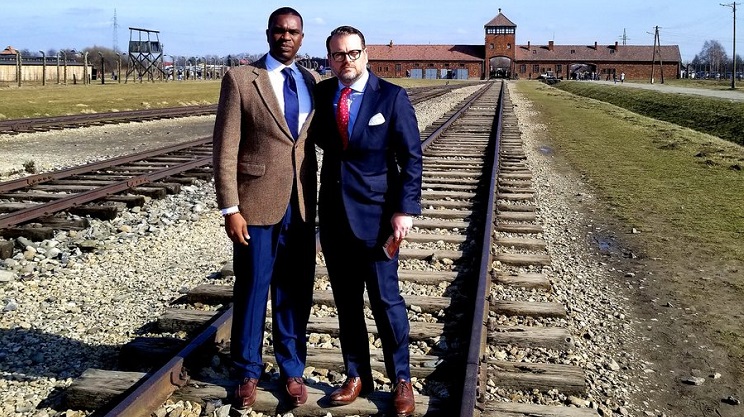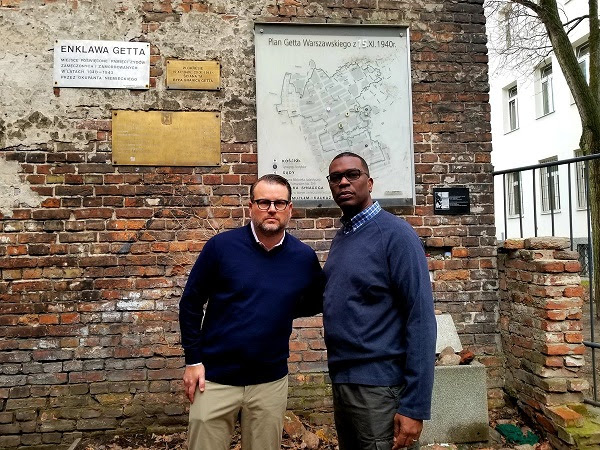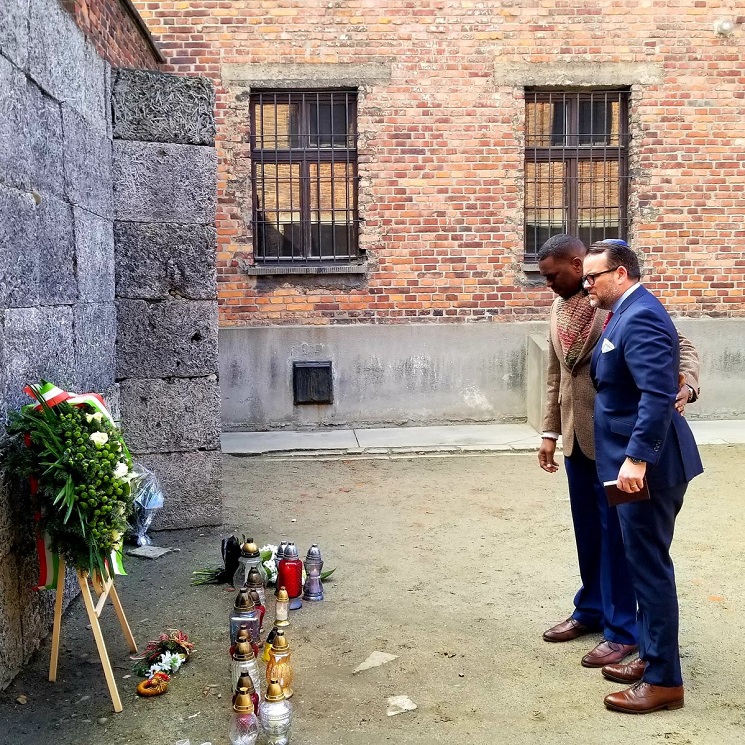
March 20, 2019
Interview with Pastor Gil Monrose and Evan Bernstein
From March 3rd to March 7th, two leaders in their respective faith communities traveled through Holocaust memorial sites in Poland in an effort to learn more about each other and further their collaboration at home in Brooklyn. Evan Bernstein is the New York/New Jersey Regional Director of the Anti-Defamation League, an anti-hate organization founded in 1913 on Jewish values. Pastor Gil Monrose is Director of Faith-Based and Clergy Initiatives at the Brooklyn Borough President’s Office, also known for his amazing work advocating for gun violence prevention.
For years, Bernstein and Pastor Monrose have partnered in the fight against hate and have connected their communities over mutual values and missions. Sharing concern over the spate of anti-Semitic and hate fueled attacks in Brooklyn, the two leaders designed this trip as a pilot for future interfaith missions focused on bridge building. They visited significant sites including the Warsaw Ghetto, the largest Jewish Community Center in Krakow, and the Auschwitz Birkenau concentration camps. Upon their return home to New York, Bernstein and Pastor Monrose reflected upon Poland and shared their insights with us.
Q1: Take us back to when you first discussed the idea of this trip. How did it come about?
Evan Bernstein: Last year I was privileged to join Pastor Monrose on a mission trip to Israel with two hundred Brooklyn United Churches congregants. I was able to observe how the trip participants reacted to some of the sites there, such as Yad Vashem – The World Holocaust Remembrance Center, and I could see that there was a lack of knowledge about Judaism and Jewish people. I realized just how little communication and interaction this community had with the Jewish population in their neighborhoods.
The anti-Semitic incidents that have occurred over the last six to eight months in Brooklyn were due to, at least partially, this same lack of communication and understanding of “the other”. Piecing these thoughts together caused me to start developing ideas to help this community experience Jewish life and history with all the senses, in a way that can’t be done in a museum. I had the idea to bring pastors to Auschwitz-Birkenau because of the magnitude of that place, and its significance to Jews of this generation. The only person that came to mind to co-pilot a model for this trip was Pastor Monrose. I wanted to bring someone that was a friend and wouldn’t be afraid to share in the experience with utmost honesty.
Pastor Monrose: When you ask someone from the “other” to stand with you on an issue, they need to understand the totality of your experience, especially the history and pain. That’s the reason we knew we had to do this trip. We need to understand each other if we are going to have any type of collaboration.
Q2. What was the experience in Poland like?
PM: I didn’t know the type of emotions I would feel when visiting the concentration camps, ghettos and other sites around Poland where death and destruction is so palpable. The image of a mirror comes to mind, in that I felt in Poland the same way I feel when I visit places of my own people’s dark history. Within the suffering of the six million who were murdered, I see similarities with the black experience. At the same time, it felt refreshing to be able to visit the Holocaust memorial sites and know that the Jewish people triumphed. The Jews rose again and here we are, going back to a place that was designed to cut off their lineage.
EB: I experienced a similar feeling. In between overwhelming sorrow and sadness, I thought about how our journey here is exactly what Hitler didn’t want to happen. A Jewish man and a Caribbean man walking around Poland, discussing how to build bridges and work together in America. It was so contrary to what the Third Reich ever thought would happen. This was the ultimate feeling of hope.

Warsaw Ghetto Memorial
Q3: What makes your partnership so valuable?
PM: Crown Heights is a critical neighborhood when I think about the communities I serve. It has a high concentration of Jews and Caribbean-Americans living within the same footprint. We cannot escape each other; we are bound by our past, present and, future. This high concentration of diversity calls for a level of understanding between groups so that all can live in peace and harmony. As Evan said earlier, the increase in anti-Semitic and hate fueled incidents in Crown Heights proves that there is work to be done here. When leaders can work together, it is easier for those who follow to do the same. That’s why Evan and I are so committed to our partnership.
EB: The need for togetherness is extremely heightened right now. There are certainly leaders in Brooklyn that are trying to bring the community together, but we need to do more and think outside the box. I see my role at ADL as a convener, and I would like to be the catalyst for more collaboration and understanding taking place.
I also really value my partner with Pastor Monrose because of his position within the community. He has a congregation and a following that look up to him as a leader. As he said himself, when leaders work together the people they influence are more willing to as well. Pastor Monrose has the ability to share this trip with his congregation and weave it into sermons that reach the whole community.
Q4: Now that you are home, what’s next?
EB: We don’t want to lose momentum. We are already thinking about planning future trips and how to enhance the experience. We have discussed adding a stop to Israel as an additional component to end on a more hopeful and positive note. Israel can showcase the progression of the Jewish people from hardship to eventually achieving the Jewish State, and I think that can provide a lot of answers about the contemporary Jewish community of today. In 2020, we also hope to develop a parallel track that explores black history in America.
We are currently sharing our journey in Poland with our various audiences, including the long-term goals that developed as a result. Having the experience of hope to go back to will be a helpful reference as these incidents occur in the community. Referencing a lived experience rather than a textbook page will be a great tool for pastors. That’s my long-term hope.
PM: I agree, experience is the greatest teacher. To experience what we did in Poland can change your language, outlook and temperament in these situations. It is truly life changing. You can’t have a full understanding of the devastation and level of cruelty that was done without seeing it with your own eyes. When you experience it, it’s easier to have a discussion and be mediators between members of your community. If there is an issue between the Caribbean-American and Jewish communities or whomever, there needs to be mediators. Mediators should understand both sides and be able to sit down and come to conclusions. There is less need for divisiveness and partisanship, but rather those in the middle who can mediate. If there were mediators in the early 20th century, maybe we wouldn’t have had the Holocaust. When you have good people who just stand by, we see what happens. People will perish.

The Auschwitz Death Wall
Q5. Tell us about the spiritual aspect of the trip.
PM: The church believes that everything happens through the will of God, and sometimes the darkest moments in history reflect the goodness in humanity. Visiting the Holocaust sites were spiritual living moments because it shows that God didn’t give up on the Jewish people, just like He didn’t give up on us during slavery. We have a God who consistently, even when there is evil in the world, takes care of His own.
EB: One spiritual moment that immediately comes to mind was at the end of the tracks at Birkenau when Pastor Monrose and I were praying alongside each other. Our prayers sounded different, but they came from the same source in our heart and soul. In these moments throughout the trip, when we prayed for the 6 million, we felt extremely connected.
PM: We are also praying for the other 6 million, the good people who stood idle and didn’t know how to interact with one another. This is happening in a lot of places, but Brooklyn is a genuine case study for this. We need to see that the only option is to live in peace and harmony, rather than try to destroy an entire race of people because of who they are. It didn’t work in the 30s or 40s and it isn’t going to work in the 21st century.
You can learn more about the work of Pastor Gil Monrose’s work at the Office of the Brooklyn Borough President Eric L. Adams at https://www.brooklyn-usa.org/.

